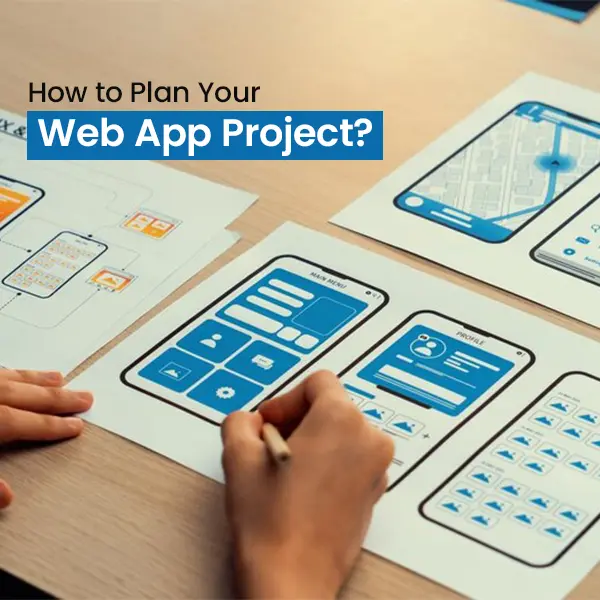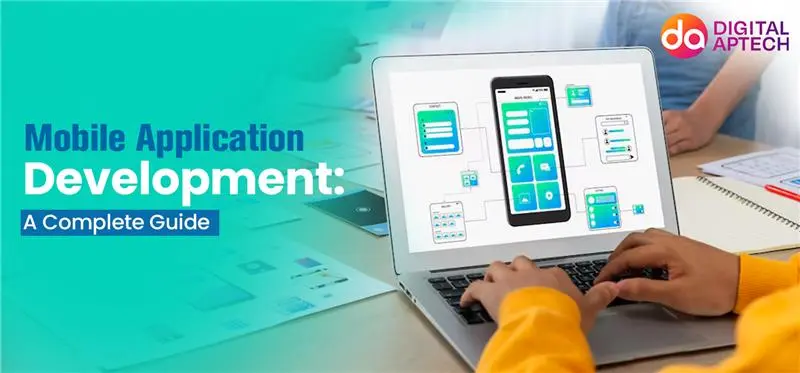Mobile apps are the foundation of our daily modern lives now. To be successful in this digital-first era, having a business app is mandatory. Whether you need to automate operations, enhance customer interaction, or ROI, a well-designed app can prove to be a game-changer. But how to turn an app idea into a complete app with mobile application development?
Developing and making a mobile app is not all about programming. It is a process involving steps such as planning, developing, testing, releasing, and so on. No matter if you require a web app or a native app, the process of development takes on different stages
This guide will help you understand mobile application development process in simple terms. From understanding what makes a great web app to the ins and outs of the mobile application development process, we’ll cover it all — including how Digital Aptech can help bring your custom app idea to life.
In this blog, we have charted out a detailed guide. This will be ideal if you have started your journey in mobile application development. Also, it will be useful if you are looking to improve your existing mobile or web app.
Mobile Apps Matter: Why
Today, mobile apps are not just a passing trend. It has become a core part of modern living. Organizations need to have dedicated apps to stay relevant, profitable, and successful. Apps help to improve product sales, customer engagement, and ROI. However, there are so many types of mobile applications and platforms.
If you are overwhelmed and cannot seem to figure it out, don’t worry. You are not alone. All you need is a clear and smart plan with expert guidance to create a useful app.
A Basic Understanding of Web Apps
You might think that mobile apps mean apps that you see in the App Store or Play Store. There is more to it. There are also web apps that you need to consider. They also play a crucial role in mobile app space.
Web App: Definition
A web application is any software application that can operate on any web browser. While native apps need to be installed, web apps don’t need installation. You can open it with a simple click on a link.
Users can access it smoothly, and update it, and is cost-effective to build. It is ideal for brands that wish to reach out to a vast network of users without app downloads.
Web Apps vs. Websites: A Comparison
Many often consider web apps and websites to be similar. A website is usually an informative platform. There could be blogs, newsletters, or portfolios to read. A web app is interactive. These include apps for booking, online banking, shopping, etc. Web apps are usually more expensive to build. They have a complex backend and can perform various tasks. A website is basically simple and can offer information only.
Progressive Web Apps (PWAs)
A Progressive Web App is the best of both worlds – apps and websites. You can use them offline and load faster. It will run on a browser, and you need not download it. These are ideal for brands that want to offer the feel of a mobile app without the high costs of a native app.
How to Plan Your Web App Project?

To start with web app development, you need a robust plan. Now, before jumping into mobile application development process, you should ask these:
- What is it intended to solve?
- What are the features to include?
- What will the platform run on?
- Who is the audience for this app?
Make sure you have a clear answer for each question. This will help to create a blueprint for an app development project. It will also help you stay focused on the task.
Designing the Perfect Web App
To make an app successful, it has to be user-friendly. The UI/UX is everything. The app should look good and feel great to use.
An exceptional mobile app design will have:
- Brand colors and fonts
- Clean UI
- Smart and intuitive navigation
- Smooth and responsive layout
- Accessibility features
Here, the designers will develop a wireframe and a prototype. They will also provide visual guides to show how the app looks.
Building Your Web App: Frontend and Backend Development
Once the design is approved, the developers start building the app. That’s both frontend (what the user interacts with) and backend (how behind the scenes the app functions).
Frontend Development
Here is where developers turn designs into clickable screens with the help of HTML, CSS, JavaScript, and frontend frameworks like React or Angular.
Backend Development
This is servers, databases, and APIs. It’s what powers your app. Usually, backend tools are Node.js, Python, and PHP.
Testing and Deployment
Your app has to be nicely tested before shipping. This is to guarantee a smooth user experience and long-term success.
Types of Testing
- Functional Testing – Is the app working as supposed or not?
- Usability Testing – Is the app easy to use and not complicated?
- Security Testing – Is user data and app systems safe?
- Performance Testing – Can the app handle real use?
- Cross-Platform Testing – Is it smoothly functional on all devices and browsers?
Quality mobile app testing avoids bugs and unhappy users.
Once all checks are cleared, the app is deployed — brought live to users. But that’s not the end of the ride.
Post-Launch Maintenance and Updates

Even after the launch is done, there is still activity going on. Performance monitoring, smoothing out wrinkles, and forcing updates on the strength of reviews are all essentials.
Periodic update maintenance keeps the application up to date and operational for some period of time.
In-house professional custom mobile app development teams frequently relied on for this task release resources for working towards company expansion.
Optimizing the Use of Low-Code/No-Code Platforms
Not every project needs traditional development. No-code and low-code platforms allow you to build apps with minimal coding — perfect for MVPs or company-wide tools.
The platforms offer drag-and-drop tools and templates, allowing them to go live faster at lower costs.
Using Low-Code/No-Code Platforms: Top Practices
- Use it for small-scale or internal projects
- Make sure it meets your performance and security requirements
- Collaborate with a developer to expand its capabilities when necessary
- Don’t use it for large or complex applications
- Low-code tools are useful but not necessarily the best fit for high-scale or custom apps.
Final Thoughts: How Digital Aptech Can Help
At Digital Aptech, we specialize in custom mobile application development that brings your ideas to life. Whether you’re building a full-featured mobile app or a scalable web app, we’re here to guide you every step of the way.
We offer:
- End-to-end mobile application development services
- Expert guidance through the full mobile app development process
- Clean, user-focused mobile app design
- Experienced developers for both frontend and backend
- Comprehensive mobile app testing
- Post-launch maintenance and optimization
- Help navigate mobile application development platforms and technologies
With years of experience and a global team, we help businesses turn app ideas into powerful digital solutions.
Allow Digital Aptech to assist you. Our team of professionals will help you bring your idea into reality with world-class solutions specially designed for your enterprise.




